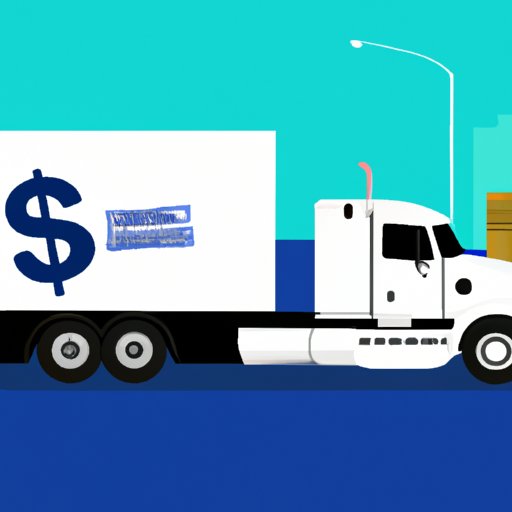Introduction
Buying a semi truck is a major investment and requires careful consideration. Financing a semi truck can be a difficult task, as there are many different routes to take when it comes to securing the necessary funds. Knowing what options are available and weighing the pros and cons of each is essential to making the best decision for your needs.
In this article, we will explore the different options available for financing a semi truck. We will discuss government grants and loans, dealership financing, bank and credit union loans, private lender financing, leasing, and personal savings. We will also provide tips for selecting the best option for you.

Research Government Grants and Loans
One of the first steps to take when looking into financing a semi truck is researching government grants and loans. The U.S. Small Business Administration (SBA) offers several loan programs that may be applicable to the purchase of a semi truck. These include the SBA 7(a) Loan Program, which offers up to $5 million in funding; the SBA 504 Loan Program, which provides up to $5.5 million in long-term, fixed-rate financing; and the SBA Microloan Program, which provides up to $50,000 in working capital.
In addition to loan programs, the SBA also offers grants for businesses in certain industries. For example, the SBA’s Small Business Innovation Research (SBIR) program awards grants of up to $250,000 for research and development projects.
To apply for an SBA loan or grant, you must meet certain eligibility requirements and submit all required documents. Once approved, the funds can be used to finance the purchase of a semi truck.

Investigate Financing Options from Truck Dealerships
Another option when financing a semi truck is to work with a dealer. Many dealerships offer financing options, typically through partnerships with banks or other financial institutions. Benefits of financing through the dealership include convenience, since the dealership can often arrange for financing with just one application, and competitive rates, since dealerships usually have access to more favorable rates than individuals.
The downside of financing through the dealership is that it can be more expensive. Dealerships typically tack on additional fees such as origination fees, and they may require a higher down payment than other financing options. Additionally, dealerships may not offer as much flexibility in terms of repayment plans or loan amounts.
Consider Taking Out a Loan from a Bank or Credit Union
Taking out a loan from a bank or credit union is another option for financing a semi truck. Banks and credit unions typically offer competitive interest rates and flexible repayment plans, making them a good choice for those who need to finance their purchase over an extended period of time. Additionally, banks and credit unions may offer special financing options for semi trucks, such as no down payment or low-interest rates.
The downside of taking out a loan from a bank or credit union is that it can take longer to get approved for a loan than it would through a dealership. Additionally, banks and credit unions may require a higher credit score than other financing options, and they may impose additional fees such as origination fees or early repayment penalties.
Look into Private Lenders for Semi-Truck Financing
Private lenders are another option for financing a semi truck. Private lenders typically offer more flexible terms than banks and credit unions, and they may be willing to approve borrowers with lower credit scores. Additionally, private lenders may offer more competitive interest rates than traditional lenders.
The downside of utilizing private lenders is that they may charge higher interest rates than traditional lenders, and they may require collateral or a cosigner. Additionally, private lenders may impose additional fees, such as origination fees or late payment fees.
Explore Leasing Options
Leasing a semi truck is a less expensive option than buying outright, as it allows you to make payments over a set period of time without having to pay the full amount up front. Additionally, leases usually come with maintenance and repair coverage, so you don’t have to worry about upkeep costs. Finally, leasing can be a good option for those who don’t plan to use the truck for an extended period of time, as leases typically last for only a few years.
The downside of leasing a semi truck is that you don’t own the truck at the end of the lease, so you won’t be able to keep it or sell it for a profit. Additionally, you may be subject to mileage restrictions and have to pay additional fees if you exceed the allowed number of miles. Finally, leasing a semi truck can be more expensive in the long run than buying it outright.
Utilize Personal Savings to Finance the Purchase
Using personal savings to finance the purchase of a semi truck is a viable option for those who have the necessary funds available. This option allows you to avoid taking on debt, and it may also enable you to negotiate better terms with the seller. Additionally, using personal savings to finance a semi truck can help you build equity in the vehicle, as any payments you make will go towards the principal balance.
The downside of using personal savings to finance the purchase of a semi truck is that it could put a strain on your finances if you don’t have enough saved up. Additionally, you may have to pay taxes on any profits you make from the sale of the truck.

Secure a Business Loan if the Semi Truck is for Commercial Use
If the semi truck is being purchased for commercial use, you may want to consider applying for a business loan. Business loans are typically easier to qualify for than personal loans, as they are based on the strength of your business rather than your personal credit score. Additionally, business loans can often provide larger loan amounts than personal loans.
When applying for a business loan, it’s important to consider the type of loan you’re applying for, the repayment terms, and any fees associated with the loan. Additionally, you should make sure you understand all of the terms and conditions before signing any agreements.
Conclusion
Financing a semi truck is a complex process that requires careful consideration. There are many different options available, including government grants and loans, dealership financing, bank and credit union loans, private lender financing, leasing, and personal savings. Each option has its own benefits and drawbacks, so it’s important to weigh all of your options before making a decision.
When selecting the best option for you, it’s important to consider factors such as the cost of the loan, the repayment terms, and any fees associated with the loan. Additionally, you should make sure you understand all of the terms and conditions before signing any agreements. By doing your research and understanding all of your options, you can choose the best option for your needs.
(Note: Is this article not meeting your expectations? Do you have knowledge or insights to share? Unlock new opportunities and expand your reach by joining our authors team. Click Registration to join us and share your expertise with our readers.)
